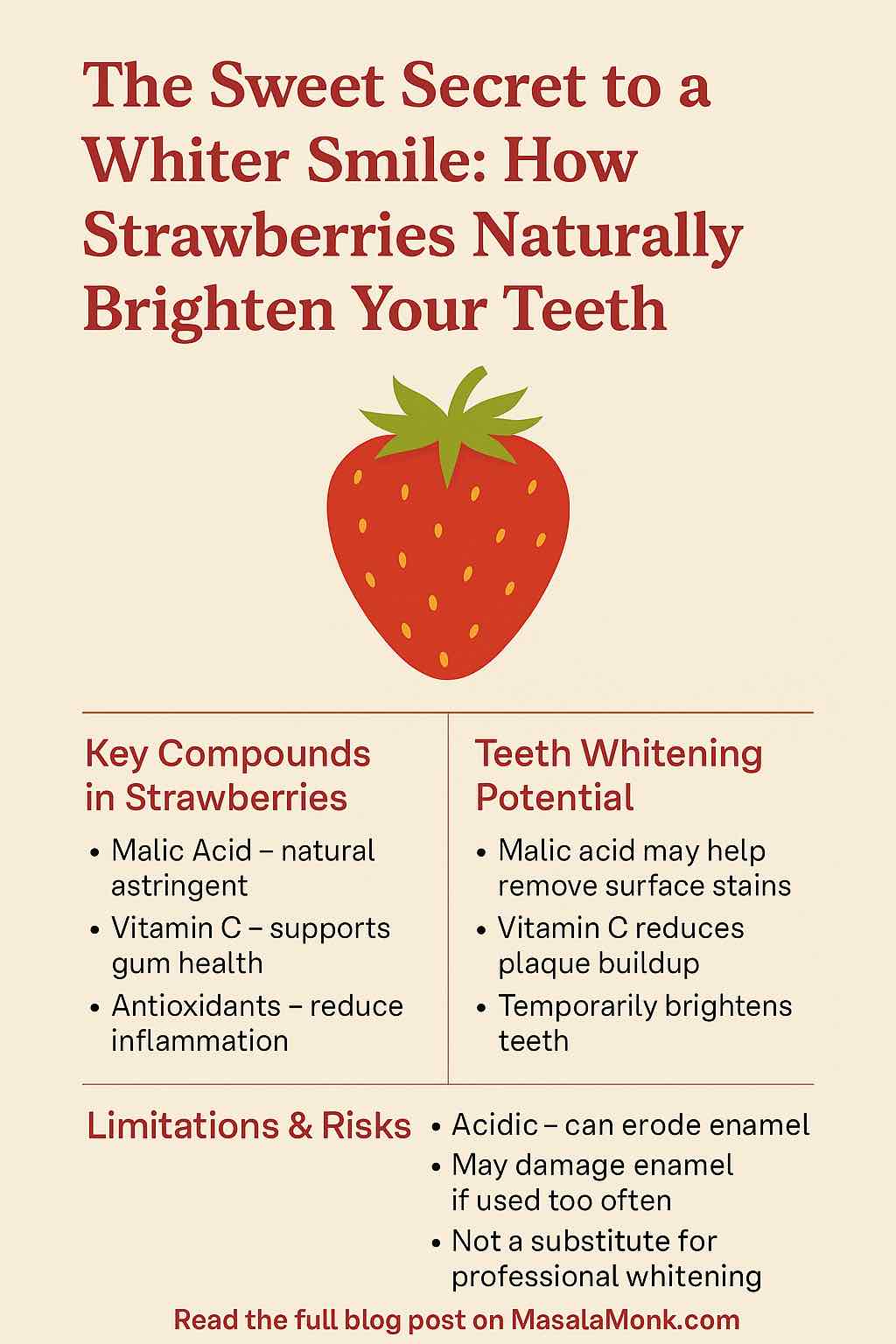
When you think about whitening your teeth, your mind probably jumps to strips, gels, or perhaps a pricey trip to the dentist. But what if the secret to a whiter smile is sitting right in your kitchen, nestled among your fruits? Meet the strawberry — the juicy, red berry that might do more than just please your taste buds. Recent studies and age-old anecdotes both suggest that strawberries could be a natural aid in brightening your teeth.
In this deep-dive, we’ll uncover the science, the myths, and the real potential behind using strawberries for a naturally radiant smile.
Section 1: What’s Inside a Strawberry That Could Help Your Teeth?
Strawberries are more than just a pretty face on your breakfast plate. They’re rich in nutrients and bioactive compounds that may contribute to oral health and surface whitening:
- Malic Acid: A naturally occurring astringent that boosts saliva production and can help dissolve surface stains on teeth.
- Vitamin C: Known for its antioxidant properties, it supports healthy gums and may help reduce plaque buildup.
- Ellagic Acid: An antioxidant that may protect against inflammation and bacterial growth.
While malic acid is the star of the show in teeth whitening, the synergy of these compounds could offer overall oral health benefits.
Section 2: How Do Strawberries Whiten Teeth? The Science Behind It
Whitening teeth is primarily about removing surface stains (extrinsic stains) and sometimes altering the inner tooth color (intrinsic stains). While strawberries can’t change your intrinsic tooth color, they can have an impact on surface-level stains caused by coffee, tea, wine, or smoking.
Malic acid acts as a gentle exfoliator for your teeth. It increases saliva flow and helps break down and remove the film of particles that accumulate on your enamel. This process doesn’t bleach the teeth per se, but it can make them appear cleaner and brighter.

Section 3: What Does the Research Say?
Strawberry-based whitening has caught the interest of researchers worldwide:
- A 2024 study examined strawberry gels with 75% and 83% concentrations. Participants used the gels twice daily over five days, resulting in a significant reduction in extrinsic tooth stains (Lobene Stain Index).
- Another study compared the whitening effects of strawberry juice to pineapple juice and honey. Strawberry juice showed a significant change in tooth brightness (median ΔE of 18.56), comparable to some peroxide-based treatments.
- A Scientific Reports article highlighted a dental formulation with strawberry extract that produced an immediate bleaching effect without harming enamel, a promising result for future natural products.
Despite these findings, most professionals agree that these effects are modest and largely temporary, working best for surface stain removal.
Section 4: The Right Way to Use Strawberries for Teeth Whitening
If you’re eager to try this fruity fix, here’s how to do it safely:
DIY Strawberry Whitening Paste:
- 1 ripe strawberry, mashed
- 1/2 teaspoon baking soda
- Mix into a paste and apply to teeth
- Leave on for 2–5 minutes
- Rinse thoroughly and brush with your regular toothpaste
Tips for Safety:
- Use no more than 1–2 times per week
- Avoid brushing immediately after application (to prevent enamel abrasion)
- Always rinse to remove sugars and acid residue
Section 5: What Dentists and Experts Say
Most dental professionals approach natural whitening methods with cautious optimism. They acknowledge that while malic acid may offer short-term cosmetic improvements, the long-term impact on enamel is a concern.
According to the American Dental Association, any whitening method should be approved for safety and effectiveness. They caution against frequent use of acidic foods directly on teeth.
Still, as a once-in-a-while refresher or part of a broader oral hygiene routine, strawberries may offer a sweet and natural boost to your smile.
Final Thoughts: Is This Berry Too Good to Be True?
Strawberries are a delicious and potentially effective way to refresh your smile, but they’re not a miracle cure. Their whitening effects are subtle and surface-level, not a replacement for professional treatments.
But when used occasionally and correctly, they can be a tasty, natural option to help your teeth look their best. Combine them with good brushing habits, flossing, and regular dental check-ups, and you’ve got a powerful formula for oral health — and a smile that shines.
So next time you’re enjoying a bowl of fresh strawberries, remember: you might just be feeding your smile as well as your appetite.
FAQs
- Can strawberries actually whiten teeth?
Yes, strawberries can help remove surface stains on teeth due to their malic acid content, which acts as a natural exfoliant. However, they do not change the intrinsic color of teeth like peroxide-based treatments. - Is it safe to use strawberries on teeth regularly?
No, regular use is not recommended. The acidity in strawberries can erode tooth enamel over time. Use no more than 1–2 times per week and always rinse thoroughly afterward. - How long does it take to see results from using strawberries?
Some users notice a slight brightening after the first few applications. However, the results are modest and temporary, and consistency (within safe limits) is key. - Can I use strawberry juice instead of mashed strawberries?
While strawberry juice contains the same active compounds, it often includes added sugars or lacks the concentration needed. Fresh, mashed strawberries are preferred for DIY use. - Is adding baking soda to strawberries necessary?
Baking soda enhances the mild abrasive effect, aiding in the removal of plaque and stains. However, it should be used cautiously, as both ingredients are mildly abrasive. - Can strawberries replace regular toothpaste or professional whitening?
No. Strawberries should only be used as a supplementary method. They don’t contain fluoride, so they can’t replace toothpaste or professional whitening treatments. - Do strawberries help with bad breath or gum health?
Indirectly, yes. The antioxidants and Vitamin C in strawberries can promote gum health, and increased saliva from malic acid may reduce dry mouth, which helps with bad breath. - Can I use frozen strawberries instead of fresh ones?
Yes, as long as they’re thawed and mashed into a paste. Ensure they contain no added sugars or preservatives. - Is it safe for children to try strawberry whitening?
It’s generally safe in moderation, but due to enamel sensitivity in children, it’s best to consult a pediatric dentist before trying any DIY whitening methods. - What should I do if my teeth feel sensitive after using strawberries?
Discontinue use immediately and avoid acidic or hot foods for a few days. Sensitivity may indicate enamel wear. Consult a dentist if symptoms persist.










